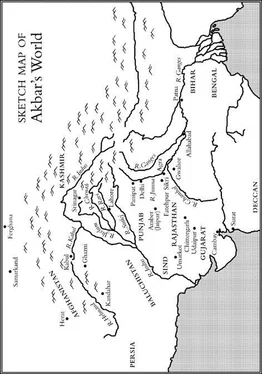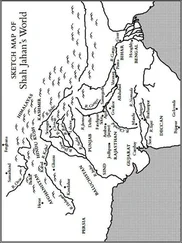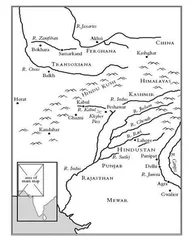Alex Rutherford - Ruler of the World
Здесь есть возможность читать онлайн «Alex Rutherford - Ruler of the World» весь текст электронной книги совершенно бесплатно (целиком полную версию без сокращений). В некоторых случаях можно слушать аудио, скачать через торрент в формате fb2 и присутствует краткое содержание. Жанр: Исторические приключения, на английском языке. Описание произведения, (предисловие) а так же отзывы посетителей доступны на портале библиотеки ЛибКат.
- Название:Ruler of the World
- Автор:
- Жанр:
- Год:неизвестен
- ISBN:нет данных
- Рейтинг книги:3 / 5. Голосов: 1
-
Избранное:Добавить в избранное
- Отзывы:
-
Ваша оценка:
- 60
- 1
- 2
- 3
- 4
- 5
Ruler of the World: краткое содержание, описание и аннотация
Предлагаем к чтению аннотацию, описание, краткое содержание или предисловие (зависит от того, что написал сам автор книги «Ruler of the World»). Если вы не нашли необходимую информацию о книге — напишите в комментариях, мы постараемся отыскать её.
Ruler of the World — читать онлайн бесплатно полную книгу (весь текст) целиком
Ниже представлен текст книги, разбитый по страницам. Система сохранения места последней прочитанной страницы, позволяет с удобством читать онлайн бесплатно книгу «Ruler of the World», без необходимости каждый раз заново искать на чём Вы остановились. Поставьте закладку, и сможете в любой момент перейти на страницу, на которой закончили чтение.
Интервал:
Закладка:
‘My men daily expose themselves to such risks. I shouldn’t scruple to do the same,’ said Akbar. He manoeuvred along to where the officer was standing pointing upwards. The top of the walls was clearly visible and there seemed to be some kind of lookout platform on them. After Akbar had watched for a minute or two, he saw two figures emerge on to the lookout and begin scanning the Moghuls’ position keenly. One — a tall, black-bearded man — pointed something out to the other. From the sparkling flashes as the sun caught the rings on his fingers and from his general demeanour he was clearly an important commander. Akbar whispered to the white-turbaned officer, ‘Get me two loaded muskets and a firing tripod. I want to bring down these fine fellows.’
Quickly two of the musketeers posted at the entrance to the sabat passed their weapons and a tripod forward to Akbar. The only way that Akbar could get sufficient elevation on the six-foot-long musket while keeping it steady on its tripod was by lowering himself on to the dusty ground and half-lying, half-crouching behind the musket. As quietly and as quickly as he could, he aligned the barrel on the jewelled man, just as if his target were a tiger in a jungle clearing. Holding his breath to keep himself as still as he was able, he fired. Coughing from the acrid smoke of the discharge, he saw the man pitch forward and plunge from the lookout platform to smash with a dull thud into the ground only a few yards away. His companion disappeared before Akbar could ready the second musket.
‘Bring the body in,’ he ordered. ‘Let’s see who we have.’
When two soldiers had dragged the broken figure over, Akbar saw that his musket ball seemed to have caught the man above the right ear, although he could not be entirely sure since much of the rest of the back of the man’s head was a bloody misshapen mess from the impact of the fall.
‘He is clearly a high-ranking officer,’ said Muhammad Beg, ‘but I don’t recognise him.’
‘Neither do I,’ said Akbar, ‘but Raja Ravi may well do so, despite the wounds, if we show the body to him. He met many of the leaders of Mewar in past years when there was less hostility between their states.’
Akbar was standing with Raja Ravi Singh on top of one of the artificial mounds of stone and mud he had had constructed some months previously to give a slightly improved view of the city of Chittorgarh. The raja spoke. ‘Majesty, since you killed Jai Mal with your fine shot the other day there has been much more activity within the fort. Despite their rejection of your offer of surrender terms when you returned the body, the defenders have clearly become unsettled by his death and the progress of the sabats . They’ve increased the number of their sorties attempting to destroy the sabats and the cannon we have dragged through them, but we’ve held them off without much difficulty. Their food must be running out too, given the number of foraging parties we’ve foiled recently.’
‘What do you think they’ll try next?’
‘I don’t know, Majesty.’
The two men stood in silence for a while until Akbar suddenly noticed spurts of orange flame and dark smoke beginning to spiral into the sky from several places at once within the fort. He had seen such fires previously but only coming from single points. Raja Ravi had told him that these were funeral pyres for important leaders killed in battle. The one that had followed the return of Jai Mal’s body had been particularly fierce. However, these new fires springing up would clearly dwarf even that.
‘What is it, Ravi?’
‘The defenders must have recognised that there is no prospect of a relieving force and that defeat is inevitable. They want to choose their own moment to die. They are making jauhar . Those fires you see are funeral pyres. The Rajput women and girls are throwing themselves into them from specially constructed platforms to burn alive. Mothers will be clamping their babies to them as they jump. The sudden spurts of orange and yellow flame you see are when the men throw buckets of oil and ghee — clarified butter — on to the pyres to increase the intensity of the heat and end their families’ suffering more quickly. Given courage by the knowledge that their wives and children are dead and can suffer no further pain or indignity at the hands of their enemies, in the morning the men and boys will dress themselves in their saffron battle robes. They will drink opium water from each other’s palms to celebrate their brotherhood and to deaden the pain of wounds, and then they will sally forth in one last heroic charge to kill as many of us, their enemies, as they can before meeting their own deaths.’
Raja Ravi’s voice was hushed and his tone admiring. After all, Ravi was a Rajput, thought Akbar. Even though such sacrifices were entirely alien and essentially abhorrent to him, Akbar too could not help but feel a degree of admiration for the heroism these women were displaying, dying inside the fortress as he watched. ‘Let the fires glow white to lessen their pain,’ he prayed. Then, once more the commander, he said to Ravi, ‘If you are right, we must prepare for their death charge. Give orders for more cannon to be hauled through the sabats tonight and positioned behind what shelter we can throw up where they have a clear field of fire along the ramp. Have musketeers and archers deploy from the exit of the tunnels at dawn. Have squadrons of horsemen and war elephants standing ready to enter them as soon as we detect movement behind the fortress’s gate. Horses and elephants will not wait in the dark of the sabats without becoming restive. It is better that they only go into them when action is close at hand.’
Early the next morning Akbar stood just outside the exit from the sabat which reached the nearest to the winding ramp leading to Chittorgarh’s main gate. His commanders were around him and he was wearing full battle garb, his gilded breastplate strapped tightly around him, his helmet squarely on his head and his grandfather’s sword Alamgir — newly sharpened and honed — at his side. During the night the defenders of Chittorgarh had fired sporadically on Akbar’s men as they feverishly constructed extra barricades around and about the sabat exits and as near to the ramp as they dared go. The Rajputs had however succeeded in killing three of a team of a dozen oxen dragging a small bronze cannon into position and the others had stampeded in panic, overturning the cannon and injuring some archers standing nearby in their rush.
But the defenders had been content to watch the cannon righted, seemingly reserving their strength and powder for their last attack the next day. Long before dawn, drums had begun to sound out from Chittorgarh’s crenellated watchtowers more loudly than Akbar had ever heard. Several hours had now passed, but their rhythm remained hypnotic, the beat incessant and accompanied by the blare and screech of long trumpets. Occasionally a great roar of voices could be heard, overtopping all other sounds, which Ravi explained was the defenders’ prayers to their Hindu gods in the fortress-city’s temples.
‘When will they attack, Ravi?’
‘It cannot be long now. They will have worked themselves into such a pitch of frenzied ecstasy that they will not be able to hold themselves back.’
A quarter of an hour later, the metal grille in front of the great iron-studded gates of Chittorgarh began slowly to wind up and behind it the wooden gates themselves started to open. As soon as there was space, a warrior on a white horse squeezed through and then, waving a curved sword above his head and with his saffron robes streaming behind him, charged down the long winding ramp. He was immediately followed by others and then by more and more riders. Soon, mixed in with them, came men and youths on foot. All were in saffron. All had weapons in their hands. All were screaming a war cry which was incomprehensible to Akbar but which Ravi hastily translated as, ‘Life is cheap, honour is not.’
Читать дальшеИнтервал:
Закладка:
Похожие книги на «Ruler of the World»
Представляем Вашему вниманию похожие книги на «Ruler of the World» списком для выбора. Мы отобрали схожую по названию и смыслу литературу в надежде предоставить читателям больше вариантов отыскать новые, интересные, ещё непрочитанные произведения.
Обсуждение, отзывы о книге «Ruler of the World» и просто собственные мнения читателей. Оставьте ваши комментарии, напишите, что Вы думаете о произведении, его смысле или главных героях. Укажите что конкретно понравилось, а что нет, и почему Вы так считаете.












